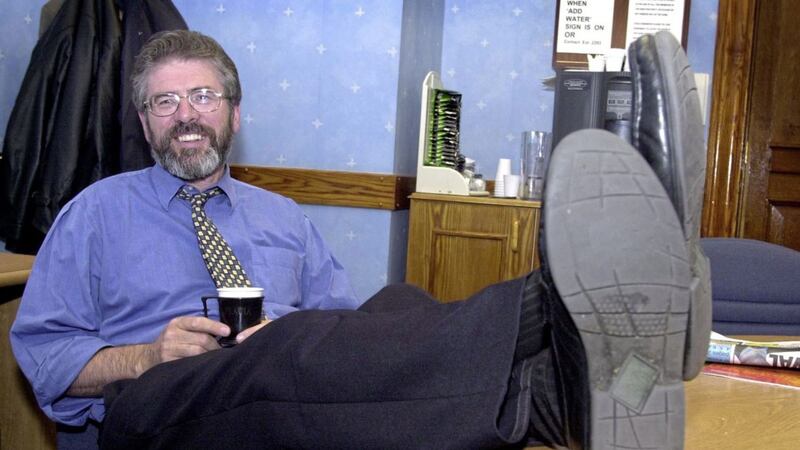He never did become a better speaker, but it never mattered.
The clunky Adams ard fhéis speech that confirmed his exit from leadership hit all the usual and expected notes with customary weightiness.
Death of Martin McGuinness, failings of the Dáil’s main parties, Brexit, shining merit of Sinn Féin, the need to keep on pushing to unite an Ireland in which northern Protestants have their rightful place, sprinkle of Irish and we’re done.
The only novel element was support for abortion provision in the Republic and his much-trailed departure.
It could be argued that this puts Sinn Féin ahead of the DUP, in terms of installing a new generation, Arlene Foster having been slotted into the job surrounded by Peter Robinson associates.
Could we say replacement of Adams at the top represents the arrival of a post-Troubles cohort, according to conflict-resolvers the breed necessary to jog our politics free of old bitterness?
It might just as likely deliver two semi-detached Sinn Féins, the southerners as ill at ease on trips to Belfast as Adams has looked and sounded in the Dáil.
At which point a dash of northern solidarity impels the reflection that the southern Adams-mockers have a nerve, in deeming him not up to Dáil discourse intellectually or linguistically.
True his broadcast election performances were mainly woeful. But on his feet in Leinster House, after the age of Enda, a fount of verbal nonsense to whom fictional citizens told neat case histories? And now the age of Leo, who as throughout his career still speaks before he thinks in the drive to deliver grabby sound-bites.
But the shadow of war still darkens Adams, no matter how statesmanlike his bearing. Inside the republican world he has provided continuity, authority and celebrity status, the pedigree his biggest asset but now present and future limitation.
Now it’s get-ready for coalition-making, government-forming and probably true that Adams is a one-man glass ceiling on the SF vote.
Even the most jaundiced SF-loather cannot talk down Mary-Lou, capable as she is of seeing off most TDs.
The installation of Michelle O’Neill by father-figures Adams and McGuinness may have skated in without internal resentment breaking cover, but it tried tempers.
McDonald will not be ‘appointed’ leader, Adams has remembered to say. Southern electorate and media demand more stage-management.
Will Leinster House’s 30-strong party field a challenger, at least for the optics?
This is a political organisation born out of a secret army, steered for decades by an ‘amazing and evolving collective leadership’, as the Adams speech had it.
He singled out a score of people including the long dead Maire Drumm, most already retired or like Martin Ferris and himself on the verge of retirement.
All but a handful of those he listed fondly were northern.
Can today’s party sustain north-south unity? Adams may himself have been the glue that held it together, though today’s northern SF cadre will not loudly rue his departure.
Turning up to bolster O’Neill has been dutiful-looking, nothing organic about it. Appearances suggest that from the outset Adams had little interest in the Stormont of this generation.
Early on there was even a period when minor figures in the machine daringly complained - where journalists could hear them - of the party president’s impatience, even snappiness, about work he wanted done.
Although he chose it, it cannot have been easy to settle into a non-ministerial slot along the bench from Martin after all that high-level hob-nobbing before the Good Friday Agreement.
Only the periodic crises brought late night crunch talks, prime ministers winging in. The move to Louth may have surprised the world outside the party but came none too soon for Adams.
Has he in truth been resented by the Dáil’s rising generation?
McDonald looks relaxed beside him, as though they do in fact have an amiable, working relationship.
How he takes himself back from the frontline and stays out of the way – of her and the latest configuration of the collective leadership – will test the old Adams reflexes, need to know, self-discipline that only rarely down the years seemed strained. Like that moment long ago when he talked tetchily about taking a sabbatical.
He leaves a party in less than perfect shape, southern polls down and bullying stories rumbling not out of sight but in full, damaging view.
Gerry Adams has grown old through war and peace, demon to outsiders, icon to his own.
The next phase of modern republicanism’s long march needs youthful energy.
The icon age is over.








